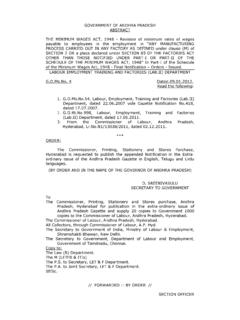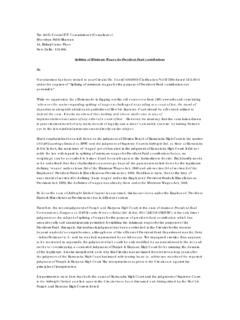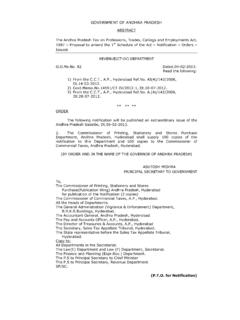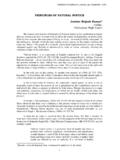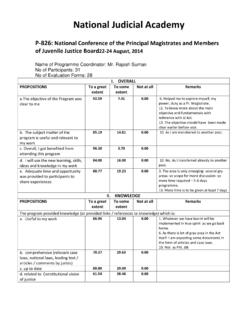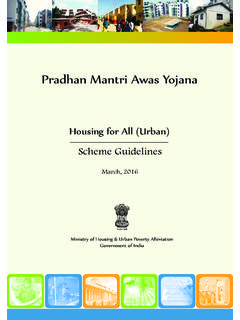Transcription of RECENT TRENDS IN LABOUR LAWS C. NIRANJAN …
1 RECENT TRENDS IN LABOUR LAWS C. NIRANJAN RAO Advocate, HyderabadINTRODUCTIONThis is an attempt to compare the judgments delivered in the 1960 To 1990 swith that of judgments delivered from 2001 onwards. The Indian Economy has undergonesignificant changes after the introduction of liberalization andglobalization. The Indian Judiciary has also taken a note of the prevailingcircumstances and there is a different direction taken by the Indian Judiciary in the recentyears. Earlier the Judiciary has taken a human approach. However, now the discipline andindustrial peace in the industry is considered to be of paramount importance.
2 With thisbackground, I tried to compare several judgments rendered by the Supreme Court and theHigh :Earlier absenteeism even for a period of 5 years was not considered as a major a judgment the Supreme Court in the case of Syed Yakoob Vs andothers reported in AIR 1964 SC 477 is relevent which dealt with that termination on theground of absenteeism and found that it was disproportionate and set-aside the terminationand granted reinstatement with full the Hon ble Supreme Court in the case reported in 2008 LLR 715SC Chairman & MD VSP and others Vs. Gokaraju Sri Prabhakar held that despite ofopportunities granted him to report for duty, he failed to report duty Absence justifiesdismissal from service - High court cannot set aside a well reasoned order only onsympathy or sentiments Once it is found that all the procedural requirements have beencomplied, the courts would not ordinarily interfere with the quantum of punishmentimposed upon a delinquent THEFT:Theft is defined as a mis-conduct under the Industrial Employment StandingOrders Act, Shops & Establishments Act and also under the IPC.
3 Earlier the quantum involved in the theft or fraud used to be the deciding factor in case of theft, fraud ordishonesty. The courts in earlier days used to take lenient view depending upon the amountinvolved in the theft and the nature of theft. A reference can be made to the judgment & Sons Pvt. Ltd., and others Vs Presiding Officer LABOUR court reported in 1974 I LLJpage herein the court has held that the amount involved in the theft is not of a highvalue and as such dismissal was a disproportionate in the RECENT days Supreme Court has taken a view that the amount involved in thetheft is not the criteria but integrity of the employee is more important. Termination ofworkmen for theft of employer s property should not be set aside reported in 2008 SupremeCourt LLR 231 in the case of workmen of Balmadies Estates Vs management of BalmadiesEstates.
4 Similar Judgements on this aspect are as ) In the case of A. Venkat Ram Vs. Depot Manager, Charminar Depot, APSRTC reportedin 2004 LLR 186, the High court has observed as follows: Unless cases of misappropriation and loss of confidence by the employees are dealt withiron-hand, it may not said right signals to the employee .B) The Supreme Court also taken the same opinion by observing that for quantum ofmoney misappropriated but the loss of confidence is the primary fact in the case of DepotManager, APSRTC Vs Raghuda Siva Shankar Prasad reported in 2007 LLR 1133. USAGE OF VULGAR LANGUAGEE arlier whenever the cases relating to usage of vulgar or abusive language reaches the courtof law, the courts have taken a view that the workers basically came from the families ofwithout much education background and they have grown in a society where usage ofdecent language was not possible.
5 Therefore keeping in view of their social status, thecourts have granted relief in favour of the workers even such misconduct was duly can be made to the case of Ramakant Mishra Vs State of UP reported in 1982 Lab ic page SC. However, now the Supreme Court in the year 2005 LLR page 360in the case of Mahindra and Mahindra Ltd., Vs. Naravade held that usage of abusiveand filthy language against superior officer held that did not call for lesser punishment SLEEPING WHILE ON DUTY :The courts are of the opinion in the earlier days that the workmen generally work for thelong hours and sleeping while on duty was not considered as a major misconductwarranting the dismissal unless it is an habitual act. In this connection, a judgment ofSupreme Court in the year 1960 in the case of Nirmal Sen Gupta Vs National CarbonCompany Ltd.
6 Is relevent. Whereas now the Supreme Court in the case of Bharat Forge Company Vs. Uttam Manoharreported in 2005 LLR 210 held that sleeping while on duty as major misconduct warrantspunishment of ASSAULTING THE SUPERIORS:The courts earlier taken a view that in some of the cases that assaulting the superior is not amajor misconduct and considered the mitigating circumstances used to grant relief infavour of the now the Supreme Court in the case of Bharat Cooking Coal Ltd., etc., Vs. BiharColliery Comgar Union reported in 2005 LLR 373 SC held that assaulting the superior is amajor misconduct and also observed that the stand taken by the earlier courts that victimdid not die because of the injuries is not a mitigating circumstance. Similar view was alsotaken by the Hon ble Supreme Court in the case of Usha Breco Mazdoor Sangh Vs Themanagement of Usha Breco Ltd and another reported in 2008 LLR page SC6.
7 STRIKE:Strike was considered to be the weapon in the hands of the workmen and the union topressurize the management and to get their demands settled. This was the approach of thejudiciary in the earlier days and a reference can be made to the case of Singh VsUnion of India reported in 1990 Lab. Ic, page 389 The Supreme Court in a landmark judgement relating to Tamilnadu GovernmentEmployees strike held that they have no statutory or constitutional right to go on strike asper the case reported in 2003 LLJ page 275. A strike is used as a tool not for the welfare of workman but for the welfare of trade unionleaders as per the Judgement in the case of Lt. Governor, Govt. of NCT of Delhi Vs. DelhiFlood Control Mazdoor Union reported in 2006 LLR 1113 (Delhi High Court).
8 A strike cannot be converted into a tool to blackmail or protect erring employee (AjayEnterprises Ltd., Vs. Secretary Govt. of NCT of Delhi reported in 2007 LLR page 86 DelhiHigh Court).7. BURDEN OF PROOF OF 240 DAYS OF SERVICE:If any workman wants to avail the protection under the Industrial Disputes Act in case ofhis dismissal or termination, he has to complete 240 days of service prior to his the courts have taken a view that the burden of proving the service of an employeelies on the management as all the records pertaining to their employment are available onlywith the management reference can be made to the case of State Bank of India Vs Mani reported in 1976 (32 ) FLR page (SC).Whereas now the Supreme Court in a series of judgments have held that the workman hasto prove by a cognate evidence that he has completed 240 days of service.
9 It was also madeclear that the burden lies on the workman but not on the management. A) Manager, RBI Banglore Vs. S. Mani 2005 FLR ) Surendra Nagar District Panchayat Vs. Jetha Bhai reported in 2005 SCC ) The Range Forest Officer Vs. , reported in 2002(93) FLR page 179 LIMITATION:Industrial disputes Act is silent about the limitation in raising the disputes. Several courtshave taken a view that in the absence of any provision under the Act, the limitation law isnot applicable to the Industrial Disputes. Reference can be made to the case of BombayGas , Vs Gopal Bhiva and others reported in 1963 (7) FLR page (SC) andalso in the case of Jai Bhagavan Vs Management of the Ambala Central Co-operative BankLtd., and another reported in 1983 (47) FLR page (SC).
10 Now the Supreme Court is of very clear opinion that even though no time limit isprescribed, parties has to approach courts within the reasonable period and rejected theclaim of workman who raises the dispute after seven years in case of Haryana State Ltd., Vs. Neelam reported in 2005 1 LLJ 1153 (SC).9. BACK-WAGESG ranting of back wages was mandatory nature by requirement during the earlier days andeven though a small lapse of the management, the courts used to grant reinstatement withfull back wages reference can be made to the case of Maharaja Sayajirao University ofBaroda Vs RS Takkar reported in 1994 III LLJ page the Supreme Court in the case of UPSRTC Vs Samala Prasad Misra reported in 2006 LLR page 586 and also in another case of Babu Lal Vs Haryana State Agri, MarketingBoard reported in 2009 LLR page 936 held that the back wages on reinstatement is nolonger the rule of thumb and also held that when the workman is not contributed for acertain period.

